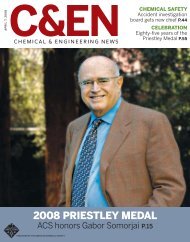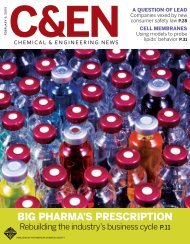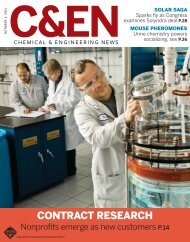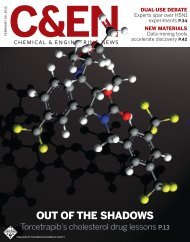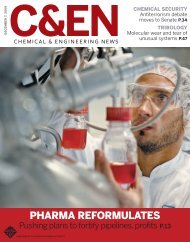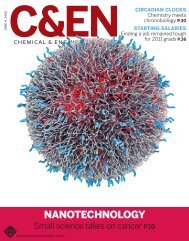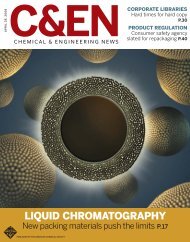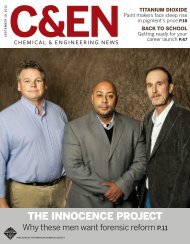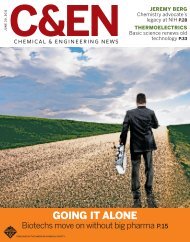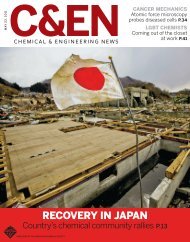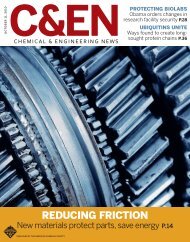Chemical & Engineering News Digital Edition ... - IMM@BUCT
Chemical & Engineering News Digital Edition ... - IMM@BUCT
Chemical & Engineering News Digital Edition ... - IMM@BUCT
You also want an ePaper? Increase the reach of your titles
YUMPU automatically turns print PDFs into web optimized ePapers that Google loves.
internship placement company, Hydac<br />
International, in Sulzbach, says: “The<br />
stereo types of Germans as unfriendly<br />
and harsh couldn’t be further from the<br />
truth. The culture is easy to adapt to,<br />
and the people are friendly and helpful.<br />
People want you to be comfortable.”<br />
There are, however, some differences<br />
that are difficult to get used to. Grocery<br />
stores don’t have baggers, Wilson<br />
says, “and if you don’t pack your bags<br />
quickly enough, you get mean looks.”<br />
Also, Germans are energy conscious,<br />
she says. “People freak out if you idle<br />
your car, leave a light on, or leave water<br />
on while washing dishes.” The people<br />
care about recycling and the environment,<br />
she adds.<br />
The hardest thing to adjust to when<br />
she returns from Germany, Wilson says,<br />
will be going from six weeks of vacation<br />
per year to only two weeks.<br />
Sarah R. Phillips, who is involved<br />
in running the NanoJapan program,<br />
says, “Reentry culture shock occurs<br />
for almost everyone who has spent a<br />
significant period of time outside of<br />
their home country.” So much about<br />
the person has changed, she says, “but<br />
their family, friends, and everything<br />
back home really haven’t. That can be a<br />
huge disconnect, and you reach a moment<br />
when it’s difficult to convey all the<br />
changes you’ve gone through.”<br />
“It’s a lot more interesting to be in”<br />
another country, Matherly says, “where<br />
everything is new and novel, rather than<br />
to be back in the U.S.”<br />
Desko agrees. “Something I discovered<br />
throughout my experiences in<br />
Thailand and grad school is that I’m<br />
not going to be satisfied in the lab all<br />
the time. I need more variety,” she says.<br />
“Just living in Thailand gave me that variety<br />
every day.”<br />
was a fun challenge.” For her, the language<br />
barrier and cultural differences allowed<br />
her to understand the difficulties foreign<br />
students face in the U.S.<br />
Many students express that same<br />
sentiment, Matherly says. “The students<br />
remember what a fish out of water they felt<br />
like when they arrived,” she says, and so<br />
they are more sensitive to the experience<br />
of foreign students.<br />
One of Raj’s main reasons for applying<br />
for a NanoJapan internship was the international<br />
aspect of the research experience.<br />
“To be a leader in science requires much<br />
more than just technical expertise,” she<br />
says. “It requires entrepreneurship and<br />
skills in leadership, communication, and,<br />
most of all, cultural awareness with the<br />
ever-increasing global collaboration. And<br />
that’s what NanoJapan offers.”<br />
Indeed, global collaboration is the goal<br />
of the German Academic Exchange Service’s<br />
(DAAD’s) Research Internships in<br />
Science & <strong>Engineering</strong> (RISE) and RISE<br />
Professional programs. The RISE program<br />
brings Canadian and American undergraduate<br />
science and engineering students to<br />
German university labs to do research with<br />
a doctoral student adviser. And the RISE<br />
Professional program places recent bachelor’s<br />
graduates and current master’s and<br />
Ph.D. students at research facilities within<br />
German chemical companies such as BASF.<br />
Each research experience is conducted<br />
in English, lasts about three months, and<br />
includes a stipend for living expenses.<br />
This past summer, DAAD initiated a pilot<br />
language grant program for a number of its<br />
RISE students to take German-language<br />
courses before starting their internships.<br />
Funded by a variety of government<br />
sources, DAAD offers many opportunities<br />
for educational exchange to and from<br />
Germany. The RISE programs were created<br />
to help balance the exchange figures, says<br />
Martina Ludwig, whose role in the North<br />
American department at DAAD’s headquarters,<br />
in Bonn, includes working with<br />
RISE program participants.<br />
Since the initiation of RISE in 2004,<br />
the number of applications has increased<br />
dramatically, says Peter Kerrigan, deputy<br />
director of DAAD’s office in New York City.<br />
“RISE is probably the most popular of our<br />
grant programs,” he says. Students at the<br />
RISE Professional level have many choices<br />
for practical research experiences, he adds.<br />
“Our goal is to make this the most attractive<br />
option for practical experience,” he says.<br />
RISE was certainly attractive enough<br />
to turn heads at NSF and the American<br />
<strong>Chemical</strong> Society. NSF was interested<br />
in establishing a multisite International<br />
Research Experience for Undergraduates<br />
(IREU) program that would send U.S. students<br />
abroad and bring foreign students to<br />
the U.S., ACS Committee on International<br />
WWW.CEN-ONLINE.ORG 59 NOVEMBER 3, 2008<br />
Activities Chair Nina I.<br />
McClelland says. “Both<br />
the U.S. and Europe<br />
are suffering from<br />
the same syndrome:<br />
Only a small number<br />
of university-bound<br />
students are electing<br />
careers in science. The<br />
EYE-OPENER<br />
Desko, pictured<br />
here at Wat Arun,<br />
in Bangkok,<br />
Thailand, gained<br />
insight into the<br />
country’s culture<br />
during her IREU.<br />
prospect to promote international collaborations<br />
is very appealing to all ends,”<br />
she says.<br />
When Christian Schaffer, director of the<br />
RISE programs, attended the 2006 ACS<br />
fall national meeting in San Francisco, the<br />
idea for an ACS/NSF/DAAD collaboration<br />
was presented to him, McClelland says.<br />
The pilot program ran in the summer of<br />
2007, with 10 students from the U.S. and 10<br />
students from Germany (C&EN, April 23,<br />
2007, page 62).<br />
“THE SUCCESS of the program led to its<br />
expansion,” McClelland says. With reciprocity<br />
from DAAD, NSF provided three<br />
more years of funding for 2008–10. For this<br />
past summer, the program also received<br />
funding from the German <strong>Chemical</strong> Society<br />
and the European Chemistry Thematic<br />
Network. The extra funding allowed 15 U.S.<br />
students to travel to Germany this summer,<br />
and an additional three U.S. students<br />
“U.S. participants, without exception, have<br />
considered this the experience of a lifetime.”<br />
COURTESY OF MARGUERITE DESKO



